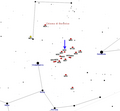Messier 88
| Messier 88 | |
|---|---|
 Spiral Galaxy Messier 88 | |
| Observation data (J2000 epoch) | |
| Constellation | Coma Berenices |
| Right ascension | 12h 31m 59.2s[1] |
| Declination | +14° 25′ 14″[1] |
| Redshift | 0.007609 |
| Heliocentric radial velocity | 2281 |
| Galactocentric velocity | 2235 |
| Apparent magnitude (V) | 10.4[1] |
| Characteristics | |
| Type | SA(rs)b, HII Sy2[1] |
| Apparent size (V) | 6.9 × 3.7 moa[1] |
| Other designations | |
| NGC 4501, UGC 7675, PGC 41517, VCC 1401[1] | |
Messier 88 (also known as M88 or NGC 4501) is a spiral galaxy about 50 to 60 million light-years away[2][3][4] in the constellation Coma Berenices. It was discovered by Charles Messier in 1781.
Properties

M88 is one of the fifteen Messier objects that belong to the nearby Virgo Cluster of galaxies. It is galaxy number 1401 in the Virgo Cluster Catalogue (VCC) of 2096 galaxies that are candidate members of the cluster.[5] M88 may be on a highly elliptical orbit that is carrying it toward the cluster center, which is occupied by the giant elliptical galaxy M87. It is currently 0.3–0.48 million parsecs from the center and will come closest to the core in about 200–300 million years. The motion of M88 through the intergalactic medium of the Virgo cluster is creating ram pressure that is stripping away the outer region of neutral hydrogen. This stripping has already been detected along the western, leading edge of the galaxy.[6]

This galaxy is inclined to the line of sight by 64°.[7] It is classified as an Sbc spiral, which lies between the Sb and Sc categories of medium-wound and loosely wound spiral arms, respectively. The arm structure of the spirals is very regular and can be followed down to the galactic core.[8] The maximum rotation velocity of the gas is 241.6 ± 4.5 km/s.[9]
M88 is also classified as a type 2 Seyfert galaxy, which means it produces narrow spectral line emission from highly ionized gas in the galactic nuclei.[10] In the core region there is a central condensation with a 230 parsec diameter, which has two concentration peaks. This condensation is being fed by inflow from the spiral arms.[11] The supermassive black hole at the core of this galaxy has 107.9 solar masses, or about 80 million times the mass of the Sun.[12]
In 1999, supernova 1999cl was discovered in this galaxy.[13]
Gallery
See also
References
- ^ a b c d e f g h "Results for NGC 4501". NASA/IPAC Extragalactic Database. California Institute of Technology. Retrieved 14 November 2006.
- ^ "Object Information". 20 September 2009. Retrieved 26 December 2012.
- ^ Nemiroff, R.; Bonnell, J., eds. (30 January 2010). "Messier 88". Astronomy Picture of the Day. NASA. Retrieved 26 December 2012.
- ^ "M88". 29 June 2011. Retrieved 26 December 2012.
- ^ Binggeli, B.; Sandage, A.; Tammann, G. A. (1985). "Studies of the Virgo Cluster. II – A catalog of 2096 galaxies in the Virgo Cluster area". Astronomical Journal. 90: 1681–1759. Bibcode:1985AJ.....90.1681B. doi:10.1086/113874.
- ^ Vollmer, B.; et al. (2008). "Pre-peak ram pressure stripping in the Virgo cluster spiral galaxy NGC 4501". Astronomy and Astrophysics. 483 (1): 89–106. arXiv:0801.4874. Bibcode:2008A&A...483...89V. doi:10.1051/0004-6361:20078139.
- ^ Tully, R. B.; Fisher, J. R. (1977). "A new method of determining distances to galaxies". Astronomy and Astrophysics. 54 (3): 661–673. Bibcode:1977A&A....54..661T.
- ^ Möllenhoff, C.; Heidt, J. (2001). "Surface photometry of spiral galaxies in NIR: Structural parameters of disks and bulges". Astronomy and Astrophysics. 368 (1): 16–37. Bibcode:2001A&A...368...16M. doi:10.1051/0004-6361:20000335.
- ^ "Database for physics of galaxies". HyperLeda. Université de Lyon. Retrieved 16 September 2009.
- ^ Sparke, L. S.; Gallagher, J. S. III (2007). Galaxies in the Universe: An Introduction. Cambridge University Press. ISBN 978-0-521-67186-6.
- ^
Onodera, S.; Sofue, Y.; Koda, J.; Nakanishi, H.; Kohno, K. (2002). "CO (J=1-0) Observations of the Non-Barred Seyfert 2 Galaxy NGC 4501". In Ikeuchi, S.; Hearnshaw, J.; Hanawa, T. (eds.). Proceedings of the IAU 8th Asian-Pacific Regional Meeting. p. 199. Bibcode:2002aprm.conf..199O.
{{cite book}}:|journal=ignored (help) - ^ Merloni, Andrea; Heinz, Sebastian; di Matteo, Tiziana (2003). "A Fundamental Plane of black hole activity". Monthly Notices of the Royal Astronomical Society. 345 (4): 1057–1076. arXiv:astro-ph/0305261. Bibcode:2003MNRAS.345.1057M. doi:10.1046/j.1365-2966.2003.07017.x.
- ^ James, N. D. (1999). "Supernova 1999cl in NGC 4501 (M88)". Journal of the British Astronomical Association. 109 (4): 178. Bibcode:1999JBAA..109..178J.
External links
- Spiral Galaxy M88 @ SEDS Messier pages
- Messier 88 on WikiSky: DSS2, SDSS, GALEX, IRAS, Hydrogen α, X-Ray, Astrophoto, Sky Map, Articles and images








